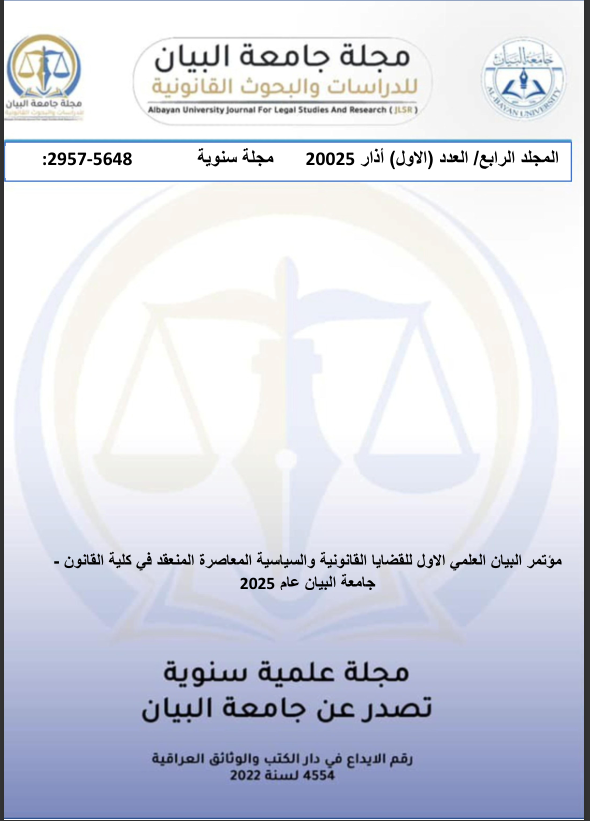النزاهة ودورها في مكافحة الفساد الأداري
DOI:
https://doi.org/10.65263/47qp3m42الكلمات المفتاحية:
الفساد الإداري-النزاهة-قاضي التحقيق-ديوان الرقابة الماليةالملخص
الفساد ظاهرة عالمية واسعة الانتشار ذات جذور عميقة تأخذ أبعادا واسعة وتدخل في أمور مختلفة يصعب تميزها فهي موجودة منذ القدم، وليس في هذا الزمن فقط. ويكاد يكون كل مجتمع، قديما كان أو حديثا لا يخلوا منه، ويكون الفساد هو التحدي الأهم الذي ستجد الحكومة والمجتمع في مواجهه وحرب معه. يشمل الفساد كمصطلح مجموعة واسعة من الممارسات السياسية والاقتصادية والإدارية والمالية المشبوهة والمشكوك فيها، فالفساد قد يكون مالياً أو إدارياً. لكن كلاهما متشابكان، ولا فرق بينهما. وكلاهما فساد، فالخلل الإداري يؤدي إلى الخلل المالي. والخطأ المالي ينتج عنه خطأ إداري. وهي ظاهرة معقدة أسبابها معقدة، وآثارها متنوعة، وتشمل أشكالا وأنماطا مختلفة لتعزيز ونشر قيم ومبادئ النزاهة وتعزيز الولاء والانتماء بين الشخص والدولة. ومن المهم أن ندرك أن القانون ليس الوسيلة الوحيدة لوقف الفساد، بل يجب أن تكون هناك ثقافة تعزز النزاهة والحفاظ على المال العام. ولا بد من التعرف على الجهات الرقابية المتمثلة بمسؤولية الجهات الرسمية في الدولة، والمؤسسات الرقابية المستقلة، والوسائل الداعمة للهيئات الرقابية لنشر ثقافة النزاهة ومكافحة الفساد في المجتمع.
المراجع
First: Books
1. Baha Zaki Mohammed: Administrative Corruption: Its Forms, Causes, and Remedies, Office of the Inspector General, Ministry of Oil, Baghdad, 2007.
Second: Constitutions
1. The Iraqi Constitution of 2005 (currently in force).
Third: Laws
1. Law No. (6) of 1990 (as amended).
2. Organic Law No. (55) of 2004.
3. Order No. (77) of 2004 concerning the Financial Audit Bureau, which refers to it as the Supreme Audit Institution in Iraq.
4. Order No. (57) of 2004 issued by the now-dissolved Coalition Provisional Authority.
5. Integrity Commission Law No. (30) of 2011 (currently in force).
Fourth: Research Papers and Articles
1. Ihsan Ali Abdulhussein, The Role of Oversight Bodies in Combating Corruption, a research paper submitted to the Integrity Commission, Department of Legal Affairs / Research and Studies Section, undated.
2. Azhar Abdullah Hassan Al-Hayali, The Impact of Administrative Corruption on Human Rights and Society, published in the Journal of the College of Law and Political Science, University of Kirkuk, October 2017.
3. Jassim Al-Saghir, Administrative Corruption: Its Negative Effects and Its Hindrance to Democratic State-Building, an article published on the website of Al-Fayhaa TV Channel.
4. Rahim Al-Ugaili, Corruption: Definition, Causes, Effects, and Means of Combating It, a research paper published by the House of Wisdom – Baghdad.
5. Adnan Qadir Aref Zangana, Administrative Corruption in Iraq: Causes and Remedies, published in the Journal of the College of Law and Political Science, University of Kirkuk, Vol. 3, Issue 11, 2014.
6. Mohammed Ismail et al., The Criminal Jurisdiction of the Integrity Commission in Iraq, published in a peer-reviewed journal issued by the University of Babylon, 2010.
7. Yasser Khalid Barakat Al-Waeli, Administrative Corruption: Its Concept and Causes, an article available on the Internet – Al-Naba Magazine, Issue 80, January 2006.
Fifth: Theses and Dissertations
1. Saad Fari Shanikher: Multiplicity of Oversight Bodies and Their Role in Detecting and Reducing Administrative Corruption (PhD Dissertation), submitted to the Higher Institute for Financial and Accounting Studies, University of Baghdad, 2010.
Sixth: Websites
1. Wikipedia, The Free Encyclopedia, ar.wikipedia.org (Last visited: 15/11/2024).
2. Ali Abdulhussein Mohsen, Explanation of the Integrity Commission Law, a research paper published on the official website www.nazaha.iq (Last visited: 18/11/2024).
التنزيلات
منشور
إصدار
القسم
الرخصة
يحتفظ المؤلفون بحقوق الطبع والنشر الكاملة لمقالهم المنشور.
تُطبّق مجلة جامعة البيان للدراسات والبحوث القانونية (AUJLSR) رخصة المشاع الإبداعي المنسوبة 4.0 الدولية (CC BY 4.0) على مقالاتنا وأعمالنا الأخرى. إذا أرسلتَ بحثك للنشر من قِبل AUJLSR، فإنك تُوافق على تطبيق رخصة CC BY 4.0 على عملك.
يمكن قراءة المقالات ومشاركتها وفقًا للشروط التالية:
النسبة: يجب أن تُنسب إلى المصدر الأصلي (Attribution).
التفاصيل الكاملة متوفرة على الرابط:
https://creativecommons.org/licenses/by/4.0/



